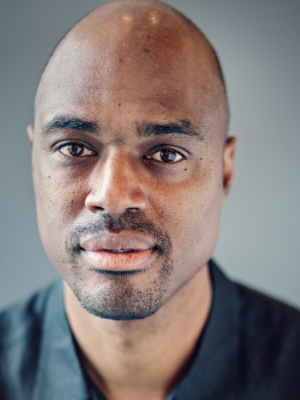DEIA Spotlight - Jelani Mahiri

Our faculty spotlight this month is on Jelani Mahiri. Jelani holds a Ph.D. in sociocultural anthropology from UC Berkeley and teaches Introduction to Africana Studies: LS194D, the first course offered in the proposed Africana Studies certificate program. He has structured the introductory course around the themes of "Blackness and Modernity." Jelani notes, "The transatlantic slave trade and European colonialism beginning in the 15th Century have greatly shaped our contemporary lives in the ways we think about race, for example, but also in the ways that we imagine progress, use science, and live in nation-state territories." Jelani believes the "lives of Africans in the diaspora really are about working toward human liberation. This is a foundational value of our nation and a value worth struggling toward over and over again."
Jelani came to Bozeman in 2007 and has been a visiting professor since 2009. He has developed a strong community on and off campus and enjoys spending time with his son. A truly multifaceted individual, Jelani has a wide range of life experiences. His undergraduate degrees are in physics and Spanish. He is a worldwide traveler who has learned to speak, read and write in Brazilian Portuguese. When beginning his graduate work, he worked with pre-eminent folklorist Professor Alan Dundes, who was Jelani's dissertation advisor before suddenly passing away in 2005. He is a photographer, has learned Afro-Cuban dance and taught salsa dancing, and has been learning to play Afro-Cuban percussion, mainly focused on congas. "It has primarily been self-study, though YouTube and the internet offer much information and instruction from many dedicated percussion teachers. Playing congas has led me to perform in musical bands in Bozeman and to compose my own music." In the summers, Jelani works in landscaping, which has led to his planting at least 1,000 trees in Bozeman and throughout the Gallatin Valley.
As a non-tenure track faculty member, Jelani primarily teaches CLS 101: Knowledge and Community and ANTY 101D: Introduction to Anthropology and L.S. 194D: Introduction to Africana Studies. He has also taught courses on Brazilian History and Culture; Latin American Popular Music and Dance; Violence in Latin America; Cuba: Race and Revolution; Myth, Ritual and Religion (anthropology); Culture and Society (ANTY 225); and the Honors College first-year sequence courses. In Spring 2022, he will teach SOCI 448: Society and Sport. In addition to his teaching, Jelani is a volunteer DJ at KGLT.
In the classroom, Jelani tries to reinforce the importance of our work in class for our shared humanity and, ideally, for our love for each other. Jelani notes that "[t]his is not about romantic love, but about respect and care. And learning about human evolution and culture in anthropology, about "blackness and modernity" and the struggles for liberation throughout the African diaspora in Africana – L.S. 194D, or about deliberate listening and presentation skills in CLS or LS 101 courses I believe can help us be better humans in the contemporary world we live in. I aim to give them confidence in being human, in all of our human failings and triumphs, and hopefully to realize that being alive, as a human, is an amazing and beautiful thing. Let's keep learning together!"
When asked about his hopes for the Africana Studies program, Jelani wrote, "The lives of Africans in the diaspora really are about working toward human liberation. This is a foundational value of our nation and a value worth struggling toward over and over again. I believe Africana studies at MSU helps to acknowledge that we should all learn as much as we can about the history and the contemporary U.S., even in a place like Montana that is predominantly white. We should ask why that is and how we can change that to live up to our national values and set an example for the U.S. and the world?.... [W]e all have so much to give and gain from learning from each other and about each other. I believe that this type of learning, giving and gaining are the first steps toward reaching some of MSU's core goals of creating global leaders who are effective communicators and creative problem-solvers. Moreover, these are important steps to building the skills, alliances, and even spaces for healing to address the larger looming questions around our physical environments and climate change."
